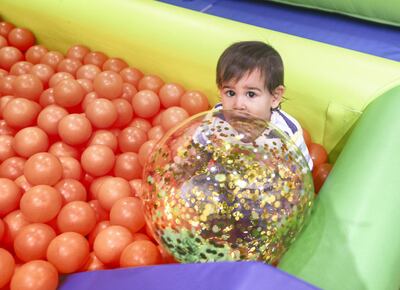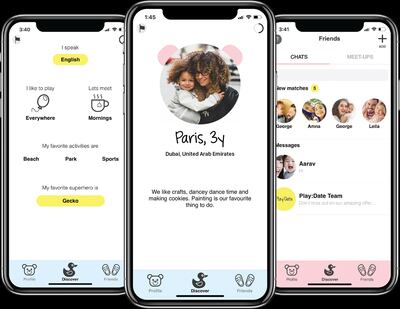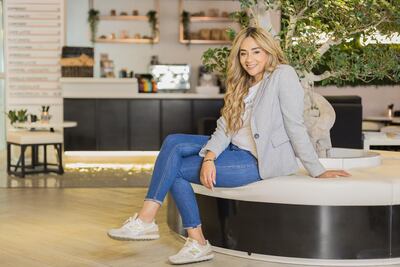Playtime, as we approach 2020, has evolved drastically from eras past. Just a decade or two ago, come evening, children rushed down to their local parks or apartment complexes to ride their bikes, play tag or mess around in sand boxes, doing, quite simply, what kids do. A baby or toddler's day out, meanwhile, involved mornings and evenings out in the pushchair, or crawling all over their homes and anyone else in sight.
However, this romanticised picture holds little relevance for the majority of families in a country such as the UAE. For those who have left familial neighbourhoods and childhood playgrounds back in their home countries, finding trusted and convenient local play spaces for their children isn't easy. A poll of 100 mothers in the UAE through the Real Mums of Dubai Facebook page discovered that 64 per cent believe it's harder to find ways for their children to socialise after moving here.
Plus, the lifestyle of choice for many includes an active nightlife and even more active nannies, making it difficult to connect with other mothers. "If you are a working mum with not many friends who have kids, it is hard. Back home, you would have your own family members with kids, and possibly more people who were settling down, not living the 'brunch' lifestyle," says Samantha Carrick-Eede, who is from New Zealand. "Also, the heat in the summer makes it hard."
The future of playdates
Consequently, initiatives and innovations – from playgroups to apps – are gaining popularity among parents seeking to promote playtime for their kids. These savvy mums and dads are tuned into research that prioritises the development of kids through socialisation; a study by the University of Chicago, for instance, found that young babies can understand social relationships, especially friendship, before they can walk or talk.
While organising play dates for babies might sound a bit premature, (pun unintended), Baby Sensory and Toddler Sense classes offered in Abu Dhabi and Dubai are popular and often fully booked. Oana Titica brought the concept to the region when she moved to Dubai from Germany almost eight years ago, and she has also secured franchises in Saudi Arabia and Bahrain. "We aim to spark a love of learning from an early age, through fun and games," says Titica, who was inspired by the research of Dr Lin Day, who first launched the concept in the UK in 2003.
"The interaction starts from seeing and becoming aware of the other babies even from the youngest age, while facing each other in a circle, or playing together in a big group with a parachute or other props," explains Titica. "Babies and toddlers dance and make music together, build together, ride on horses, play with balls and so on. You often see babies laughing with each other, and later on passing toys between them. There are also opportunities to develop social skills, such as turn-taking, sharing and negotiation."
The benefits that classes can have
While traditionalists may see such classes as a manufactured, unnatural or forced version of playtime, Titica claims it's just the opposite. "We provide a place for a very natural, cognitive approach to learning – through play, games, singing and music, sensory stimulation and signing, imagination games and a lot of movement. These are all activities babies and toddlers need; this is what stimulates the development of the brain and the rest of the nervous system, the social and motor skills, the communication ability, as well as an understanding of the world," she explains. "You'll also see activities based on everyday objects and home-made toys, such as a train made out of cardboard boxes."
In that sense, such classes can be looked upon as providing young children with the lessons today's adults were taught by their parents and grandparents, just using organised group formations and simulations. And the introduction of DIY toys offers a stark but welcome contrast to the smartphones kids are often given as playthings as early as in the first year of their lives.
Here's where apps come in
Mobile phones, as it turns out, are the crux of another innovation that promotes playtime in the UAE – apps. However, it's parents, not children, who engage with these to chalk out a playtime plan. One of the latest apps on the market is called Play:Date.
"Parents are struggling with extracurricular activities for their kids and hate watching them get bored at home," says founder Shamim Kassibawi, who has lived in Dubai for 11 years, and embarked on her entrepreneurial journey after noticing her niece was often left playing alone.
With Play:Date – which is free to use – parents can create profiles for children ages 12 and under, and meet other parents with kids in a similar boat. The app also give users access to events, workshops and discount codes for various activities. According to Kassibawi, there is a clear demand in the UAE for convenient ways for kids to socialise. "We regularly monitor various mummy-related groups and notice the majority are constantly asking about play dates and fun activities for their children," she explains.
"Friendships add to your child's social skills, and help them foster empathy, teach them about conversing and other important life skills," says Kassibawi, adding that the app even helps parents and families as a whole connect; a point Titica makes about her Baby Sensory and Toddler Sense classes, too.
Why Dubai was the perfect place to launch the app
Though she has plans for international expansion, Dubai, says Kassibawi, was the ideal place to launch Play:Date. “It’s not only ‘expat central’, but also a very safe, secure city,” she says.
“In today’s day and age, we understand it can be difficult to run a family due to increasing costs, so we’d like to help and try to make it a little easier for the community as a whole.”
While many parents, this writer included, try to keep phone-time separate from parenting-time, it’s becoming increasingly tricky. I use an app to track my baby’s feeds and naps. After she’s six months old, I’ll stop – or so I tell myself, forever struggling to shield her from the digital world.
Kassibawi sees this as a pipe dream. "Times have changed. For us to grow as a society, each one of us has to adapt and move ahead. We see couples meeting each other online, we find like-minded friends in a new city online and millennials are even finding jobs online – all via apps," she says, adding that while our parents and grandparents did not raise their kids this way, they didn't shop online, either. The question is if there was such easy and helpful access, wouldn't they?




